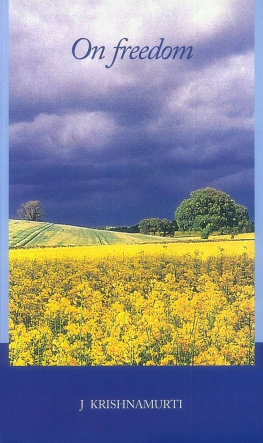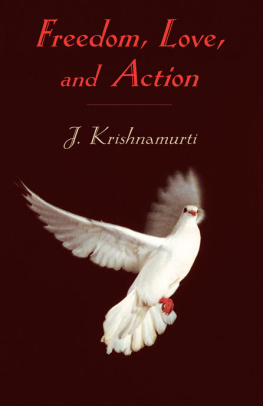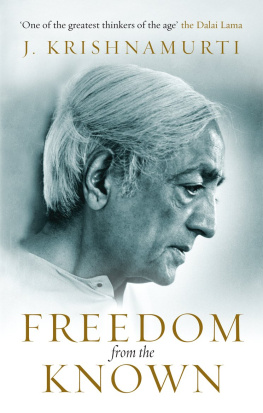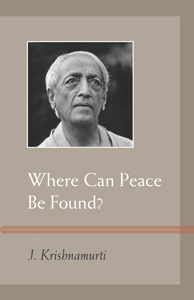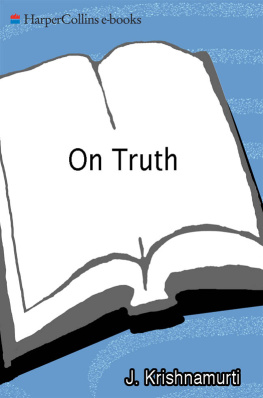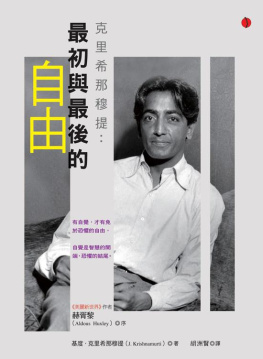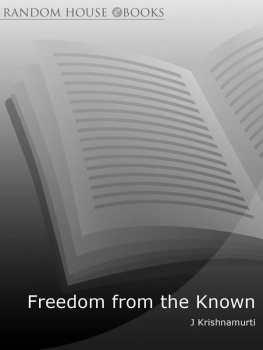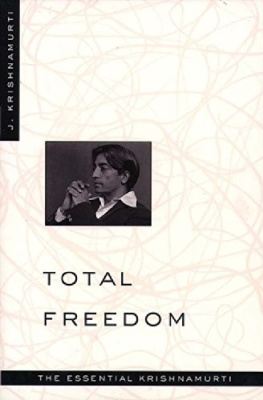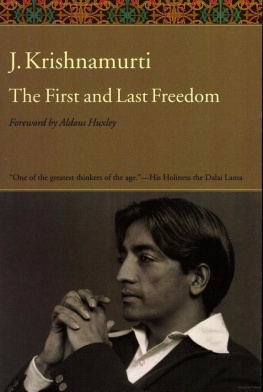Krishnamurti - The First and Last Freedom
Here you can read online Krishnamurti - The First and Last Freedom full text of the book (entire story) in english for free. Download pdf and epub, get meaning, cover and reviews about this ebook. year: 2014, publisher: HarperCollins e-Books, genre: Religion. Description of the work, (preface) as well as reviews are available. Best literature library LitArk.com created for fans of good reading and offers a wide selection of genres:
Romance novel
Science fiction
Adventure
Detective
Science
History
Home and family
Prose
Art
Politics
Computer
Non-fiction
Religion
Business
Children
Humor
Choose a favorite category and find really read worthwhile books. Enjoy immersion in the world of imagination, feel the emotions of the characters or learn something new for yourself, make an fascinating discovery.
- Book:The First and Last Freedom
- Author:
- Publisher:HarperCollins e-Books
- Genre:
- Year:2014
- Rating:3 / 5
- Favourites:Add to favourites
- Your mark:
- 60
- 1
- 2
- 3
- 4
- 5
The First and Last Freedom: summary, description and annotation
We offer to read an annotation, description, summary or preface (depends on what the author of the book "The First and Last Freedom" wrote himself). If you haven't found the necessary information about the book — write in the comments, we will try to find it.
The First and Last Freedom — read online for free the complete book (whole text) full work
Below is the text of the book, divided by pages. System saving the place of the last page read, allows you to conveniently read the book "The First and Last Freedom" online for free, without having to search again every time where you left off. Put a bookmark, and you can go to the page where you finished reading at any time.
Font size:
Interval:
Bookmark:
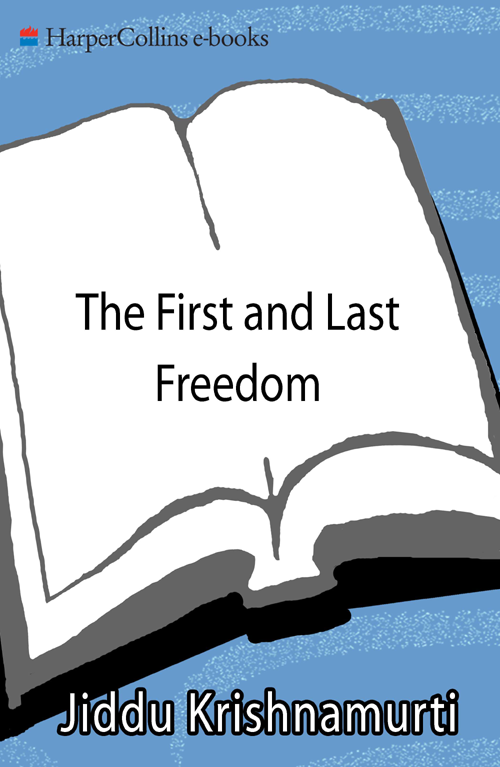
THE FIRST AND LAST
FREEDOM
by
J. KRISHNAMURTI
with a foreword by
ALDOUS HUXLEY

M AN IS AN amphibian who lives simultaneously in two worldsthe given and the home-made, the world of matter, life and consciousness and the world of symbols. In our thinking we make use of a great variety of symbol-systemslinguistic, mathematical, pictorial, musical, ritualistic. Without such symbol-systems we should have no art, no science, no law, no philosophy, not so much as the rudiments of civilization: in other words, we should be animals.
Symbols, then, are indispensable. But symbolsas the history of our own and every other age makes so abundantly clearcan also be fatal. Consider, for example, the domain of science on the one hand, the domain of politics and religion on the other. Thinking in terms of, and acting in response to, one set of symbols, we have come, in some small measure, to understand and control the elementary forces of nature. Thinking in terms of, and acting in response to, another set of symbols, we use these forces as instruments of mass murder and collective suicide. In the first case the explanatory symbols were well chosen, carefully analysed and progressively adapted to the emergent facts of physical existence. In the second case symbols originally ill-chosen were never subjected to thorough-going analysis and never re-formulated so as to harmonize with the emergent facts of human existence. Worse still, these misleading symbols were everywhere treated with a wholly unwarranted respect, as though, in some mysterious way, they were more real than the realities to which they referred. In the contexts of religion and politics, words are not regarded as standing, rather inadequately, for things and events; on the contrary, tilings and events are regarded as particular illustrations of words.
Up to the present symbols have been used realistically only in those fields which we do not feel to be supremely important. In every situation involving our deeper impulses we have insisted on using symbols, not merely unrealistically, but idolatrously, even insanely. The result is that we have been able to commit, in cold blood and over long periods of time, acts of which the brutes are capable only for brief moments and at the frantic height of rage, desire or fear. Because they use and worship symbols, men can become idealists; and, being idealists, they can transform the animals intermittent greed into the grandiose imperialisms of a Rhodes or a J. P. Morgan; the animals intermittent love of bullying into Stalinism or the Spanish Inquisition; the animals intermittent attachment to its territory into the calculated frenzies of nationalism. Happily, they can also transform the animals intermittent kindliness into the lifelong charity of an Elizabeth Fry or a Vincent de Paul; the animals intermittent devotion to its mate and its young into that reasoned and persistent co-operation which, up to the present, has proved strong enough to save the world from the consequences of the other, the disastrous kind of idealism. Will it go on being able to save the world? The question cannot be answered. All we can say is that, with the idealists of nationalism holding the A-bomb, the odds in favour of the idealists of co-operation and charity have sharply declined.
Even the best cookery book is no substitute for even the worst dinner. The fact seems sufficiently obvious. And yet, throughout the ages, the most profound philosophers, the most learned and acute theologians have constantly fallen into the error of identifying their purely verbal constructions with facts, or into the yet more enormous error of imagining that symbols are somehow more real than what they stand for. Their word-worship did not go without protest. Only the spirit, said St. Paul, gives life; the letter kills. And why, asks Eckhart, why do you prate of God? Whatever you say of God is untrue. At the other end of the world the author of one of the Mahayana sutras affirmed that the truth was never preached by the Buddha, seeing that you have to realize it within yourself. Such utterances were felt to be profoundly subversive, and respectable people ignored them. The strange idolatrous over-estimation of words and emblems continued unchecked. Religions declined; but the old habit of formulating creeds and imposing belief in dogmas persisted even among the atheists.
In recent years logicians and semanticists have carried out a very thorough analysis of the symbols, in terms of which men do their thinking. Linguistics has become a science, and one may even study a subject to which the late Benjamin Whorf gave the name of meta-linguistics. All this is greatly to the good; but it is not enough. Logic and semantics, linguistics and meta-linguisticsthese are purely intellectual disciplines. They analyse the various ways, correct and incorrect, meaningful and meaningless, in which words can be related to things, processes and events. But they offer no guidance, in regard to the much more fundamental problem of the relationship of man in his psychophysical totality, on the one hand, and his two worlds, of data and of symbols, on the other.
In every region and at every period of history, the problem has been repeatedly solved by individual men and women. Even when they spoke or wrote, these individuals created no systemsfor they knew that every system is a standing temptation to take symbols too seriously, to pay more attention to words than to the realities for which the words are supposed to stand. Their aim was never to offer ready-made explanations and panaceas; it was to induce people to diagnose and cure their own ills, to get them to go to the place where mans problem and its solution present themselves directly to experience.
In this volume of selections from the writings and recorded talks of Krishnamurti, the reader will find a clear contemporary statement of the fundamental human problem, together with an invitation to solve it in the only way in which it can be solvedfor and by himself. The collective solutions, to which so many so desperately pin their faith, are never adequate. To understand the misery and confusion that exist within ourselves, and so in the world, we must first find clarity within ourselves, and that clarity comes about through right thinking. This clarity is not to be organized, for it cannot be exchanged with another. Organized group thought is merely repetitive. Clarity is not the result of verbal assertion, but of intense self-awareness and right thinking. Right thinking is not the outcome of or mere cultivation of the intellect, nor is it conformity to pattern, however worthy and noble. Right thinking comes with self-knowledge. Without understanding yourself, you have no basis for thought; without self-knowledge, what you think is not true.
This fundamental theme is developed by Krishnamurti in passage after passage. There is hope in men, not in society, not in systems, organized religious systems, but in you and in me. Organized religions, with their mediators, their sacred books, their dogmas, their hierarchies and rituals, offer only a false solution to the basic problem. When you quote the Bhagavad Gita, or the Bible, or some Chinese Sacred Book, surely you are merely repeating, are you not? And what you are repeating is not the truth. It is a lie; for truth cannot be repeated. A lie can be extended, propounded and repeated, but not truth; and when you repeat truth, it ceases to be truth, and therefore sacred books are unimportant. It is through self-knowledge, not through belief in somebody elses symbols, that a man comes to the eternal reality, in which his being is grounded. Belief in the complete adequacy and superlative value of any given symbol-system leads not to liberation, but to history, to more of the same old disasters. Belief inevitably separates. If you have a belief, or when you seek security in your particular belief, you become separated from those who seek security in some other form of belief. All organized beliefs are based on separation, though they may preach brotherhood. The man who has successfully solved the problem of his relations with the two worlds of data and symbols, is a man who has no beliefs. With regard to the problems of practical life he entertains a series of working hypotheses, which serve his purposes, but are taken no more seriously than any other kind of tool or instrument. With regard to his fellow beings and to the reality in which they are grounded, he has the direct experiences of love and insight. It is to protect himself from beliefs that Krishnamurti has not read any sacred literature, neither the
Next pageFont size:
Interval:
Bookmark:
Similar books «The First and Last Freedom»
Look at similar books to The First and Last Freedom. We have selected literature similar in name and meaning in the hope of providing readers with more options to find new, interesting, not yet read works.
Discussion, reviews of the book The First and Last Freedom and just readers' own opinions. Leave your comments, write what you think about the work, its meaning or the main characters. Specify what exactly you liked and what you didn't like, and why you think so.








